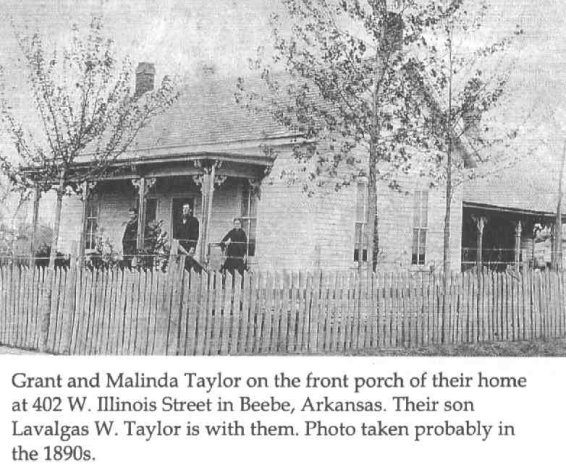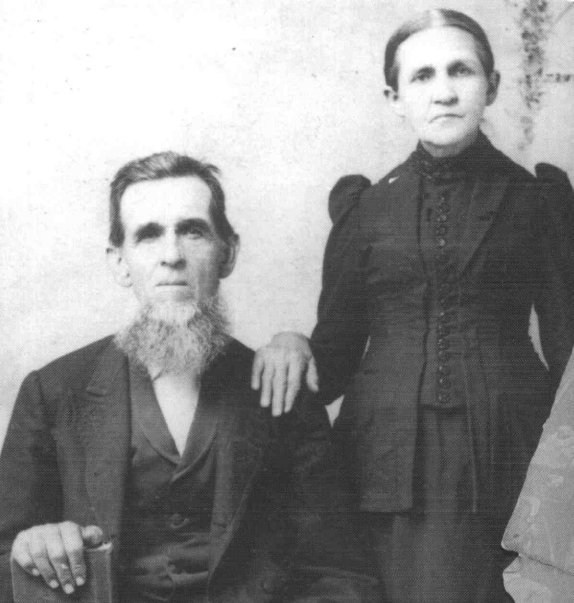
Former Beebe couple’s Civil War letters published in a book titled,
This Cruel War
By HEBER TAYLOR
Arkansas Democrat-Gazette, December 3, 2000
The Civil War letters of a former Beebe mayor and his wife can be read and enjoyed in a book published this year by the Mercer University Press in Macon, Ga. The book may be of special interest to readers because of the Taylors’ Beebe connection.
Grant Taylor was a private in the 40th Alabama Infantry Regiment when he wrote letters home to his wife, Malinda, and his four children. Malinda would answer while trying to keep the farm and family going.
The letters were saved, except for some of Malinda’s that Grant destroyed in the middle of the war. More than 160 of the couple’s letters were discovered in a suitcase by a great-grandson in 1988. Ann K. Blomquist, a distant relative who teaches high school math in Florida, and Robert A. Taylor, a Florida history professor who is not a relative, served as editors of the letters. They researched helpful background material on Grant and Malinda and on the many people, places and military events mentioned in this correspondence.
The editors chose This Cruel War as the title of the book because Grant, a deeply religious man, used those words at least six times to describe the conflict. Once he wrote, "What a number of widows and orphans are being left by this cruel war." In another letter, he wrote, "Would to God that this cruel war might close"

Grant was a rifleman and occasional cook with his regiment from its start until it surrendered at Vicksburg in 1863. Along with many other Southerners, he was paroled and allowed to spend some time at home. But before long, the 40th formed again, and Grant went with it to fight in losing battles at Lookout Mountain and Missionary Ridge. He also participated in the Atlanta campaign.
In the editors’ words, his letters present "a grim soldier’s story of hard marching, short rations, inadequate clothes, illness and the constant fear of being wounded or killed in battle."
The letters show that Grant and Malinda deeply cared for each other and their children. The letters also show that Malinda, who at first was afraid to be at home at night without Grant, gained confidence that she could manage well at home. She prayed often for his safety and speedy return home, just as he prayed often for her and the children.
A fifth child was born during the war. After it was over, the couple had three more children.
Reached by phone recently, Blomquist said that the Taylors most likely moved from Alabama to Beebe in 1880 for religious reasons. "They had earlier moved to another county in Alabama to start a Baptist church," she said. "I think they went to Arkansas to help begin a church there."
Blomquist thinks that Grant probably continued to farm after the move to Beebe. He may have also taught school as he had done in Alabama.
The Taylors arrived in Beebe when the young town was growing rapidly. It was settled in 1872, and by 1878 had 300 people, 18 businesses and two churches.
By 1884, it had grown to about 1,000 in population and had six churches and two weekly newspapers. In all probability, Grant was active in one of the churches in the community.
The editors discovered a portrait of Grant and Malinda taken in Beebe in the early 1880s. A book in his hand appears to be a Bible. Another photo shows the family home at 402 W. Illinois St. in Beebe. Grant, Malinda and their son Lavalgas are shown standing on the front porch.
There were heartaches as well as good times for the Taylors in the Beebe years. In 1883, Malinda’s father, Wiley Slaughter, died while visiting from Alabama. He was buried in Beebe. In 1884, William, the son born during the Civil War, was killed in a train accident. In 1887, Walter, the youngest child, was killed in a mill accident.
Blomquist said that the Taylors’ son James served 32 years as a missionary in Brazil. "He was a major founder of Baptist churches in Sao Paulo," she said.
Two of the Taylor children, Matthew and Mary, raised their families in Greene County, Ala. Leonard and Lavalgas, however, stayed close to their parents. Lavalgas became a jeweler in Beebe. His son, Joe Grant Taylor, joined the Arkansas National Guard, and a picture thought to have been taken in 1925 shows him in a group of 20 Guardsmen. That photo, a photo of Grant and Malinda and a copy of This Cruel War were sent to the White County Historical Society several weeks ago by Mary Cornell, Joe Grant Taylor’s granddaughter, who lives in Denver.
Leonard Taylor’s daughters, Mamie and Elizabeth, married into the Young and Jernigan families, respectively. Neither Blomquist nor Cornell knows of Taylor descendents living in the Beebe area at present.
Grant became mayor of Beebe in April 1897 and served only until October. A possible reason for his short tenure was Malinda’s death at age 64 in July of that year. Blomquist thinks that Grant remained in Beebe until about 1900, before moving back to Alabama. He apparently turned the wartime letters over to his daughter Mary before dying in 1908 at age 80. His body was brought back to Beebe for burial. A photo in This Cruel War shows his tombstone beside his beloved Malinda’s. The year of death on his stone is wrong; it shows 1907 when it should be 1908, Blomquist said.
This Cruel War helps readers understand how a family that did not have slaves and did not want their state to secede from the Union coped during the Civil War. Blomquist believes that the Taylors’ faith in God, more than anything else, helped them make it through the conflict.
If you have additional information on the Grant family, please contact the White County Historical Society, P.O. Box 537, Searcy, AR 72145.